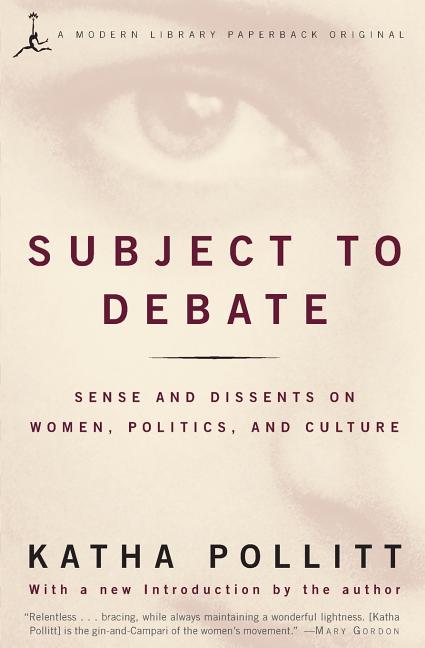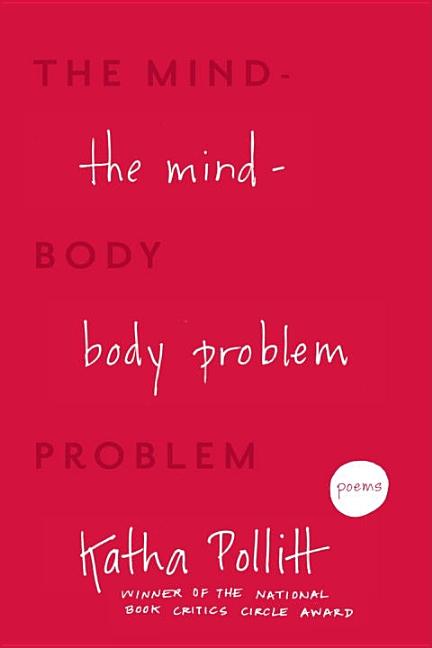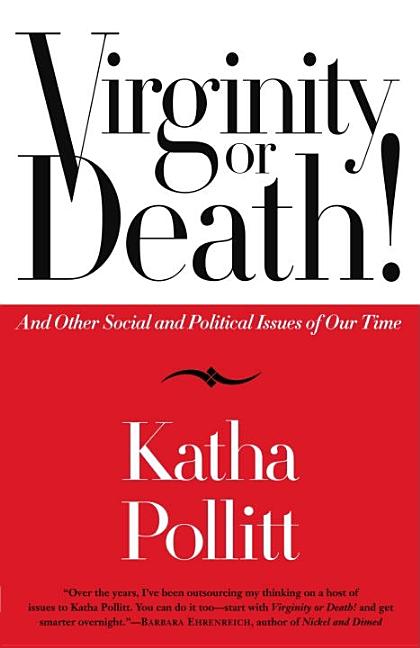The first book by Katha Pollitt, with poems exploring a diversity of subjects including ballet, Japanese paintings, and a satirical view of vegetables. Winner of the National Book Critics Circle Award (1983).

The first book by Katha Pollitt, with poems exploring a diversity of subjects including ballet, Japanese paintings, and a satirical view of vegetables. Winner of the National Book Critics Circle Award (1983).

Celebrated for her award-winning political columns, criticism, and poetry, Katha Pollitt now shows us another side of her talent. Learning to Drive is a surprising, revealing, and entertaining collection of stories drawn from the author’s own life. With deep feeling and sharp insight, Pollitt writes about the death of her father; the sad but noble final days of a leftist study group of which she was a member; and the betrayal and heartbreak inflicted by a man who seriously deceived her. (Her infinitely patient, gentle driving instructor points out her weakness—“Observation, Katha, observation!”) She also offers a candid view of her preoccupation with her ex-lover’s haunting presence on the Internet, and her search there for a secret link that might provide a revelation about him that will Explain Everything.
Other topics include the differences between women and men—“More than half the male members of the Donner party died of cold and starvation, but three quarters of the females survived, saved by that extra layer of fat we spend our lives trying to get rid of”—and the practical implications of political theory: “What if socialism—all that warmhearted folderol about community and solidarity and sharing was just an elaborate con job, a way for men to avoid supporting their kids?” Learning to Drive demonstrates that while Katha Pollitt is undeniably one of our era’s most profound observers of culture, society, and politics, she is just as impressively a wise, graceful, and honest observer of her own and others’ human nature.

Forty years after the landmark Roe v. Wade ruling, “abortion” is still a word that is said with outright hostility by many, despite the fact that one in three American women will have terminated at least one pregnancy by menopause. Even those who support a woman’s right to an abortion often qualify their support by saying abortion is a “bad thing,” an “agonizing decision,” making the medical procedure so remote and radioactive that it takes it out of the world of the everyday, turning an act that is normal and necessary into something shameful and secretive. Meanwhile, with each passing day, the rights upheld by the Supreme Court are being systematically eroded by state laws designed to end abortion outright. In this urgent, controversial book, Katha Pollitt reframes abortion as a common part of a woman’s reproductive life, one that should be accepted as a moral right with positive social implications. In Pro, Pollitt takes on the personhood argument, reaffirms the priority of a woman’s life and health, and discusses why terminating a pregnancy can be a force for good for women, families, and society. It is time, Pollitt argues, that we reclaim the lives and the rights of women and mothers.

She writes about sex, children's books, the media, breast implants, and the mind of an antiabortionist. She invokes Moby Dick and Gilligan's Island, Lorena Bobbitt and Lysistrata ("the original woman's strike-for-peace-nik"). For more than a decade, in her wonderfully provocative, wittily astute, graceful and gutsy pieces in The Nation, The New Yorker and The New York Times, she has taken the strongest positions on the thorniest moral issues and the most controversial events, from date rape to surrogate motherhood, to violence against women, to the Anita Hill hearings, to fetal rights and mothers' "wrongs." The best of her pieces are gathered here.

Subject to Debate, Katha Pollitt's column in The Nation, has offered readers clear-eyed yet provocative observations on women, politics, and culture for more than seven years. Bringing together eighty-eight of her most astute essays on hot-button topics like abortion, affirmative action, and school vouchers, this selection displays the full range of her indefatigable wit and brilliance. Her stirring new Introduction offers a seasoned critique of feminism at the millennium and is a clarion call for renewed activism against social injustice.

In The Mind-Body Problem, Katha Pollitt takes the ordinary events of life—her own and others’—and turns them into brilliant, poignant, and often funny poems that are full of surprises and originality. Pollitt’s imagination is stirred by conflict and juxtaposition, by the contrast (but also the connection) between logic and feeling, between the real and the transcendent, between our outer and inner selves: Jane Austen slides her manuscript under her blotter, bewildered young mothers chat politely on the playground, the simple lines of a Chinese bowl in a thrift store remind the poet of the only apparent simplicities of her childhood. The title poem hilariously and ruefully depicts the friction between passion and repression (“Perhaps / my body would have liked to make some of our dates, / to come home at four in the morning and answer my scowl / with ‘None of your business!’ ”). In a sequence of nine poems, Pollitt turns to the Bible for inspiration, transforming some of the oldest tales of Western civilization into subversive modern parables: What if Adam and Eve couldn’t wait to leave Eden? What if God needs us more than we need him? With these moving, vivid, and utterly distinctive poems, Katha Pollitt reminds us that poetry can be both profound and accessible, and reconfirms her standing in the first rank of modern American poets.

Through presidential administrations Democratic and Republican, Katha Pollitt has observed and exposed the inconsistencies and illogic of those who stand in the way of progress solely to hold on to their power. In defense of human rights and equality, she assails the corrupt and educates the misguided with compassion, Swiftian wit, and complete literary authority. In this compelling collection, Pollitt skewers one hypocrite after another. She suggests, for example, that creationists be permitted to oppose the teaching of evolution only so long as they agree to forgo the benefits of the theory—such as flu vaccines. She gently wonders if those who denounced the decision to allow Terri Schiavo to die in peace would themselves be satisfied to be video-diagnosed by Senator Bill Frist. And in the title essay about fundamentalists’ antagonism toward sex education and STD prevention, she asks, “What is it with these right-wing Christians? Faced with a choice between sex and death, they choose death every time.” Pollitt is one of the most eloquent and persuasive voices in American political conversation of this or any other era, and Virginity or Death! Is a marvelous demonstration of her keen insight, mordant humor, and sense of justice.
